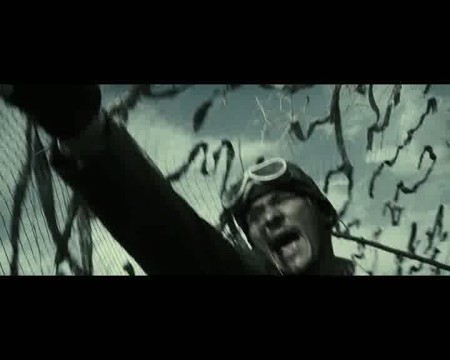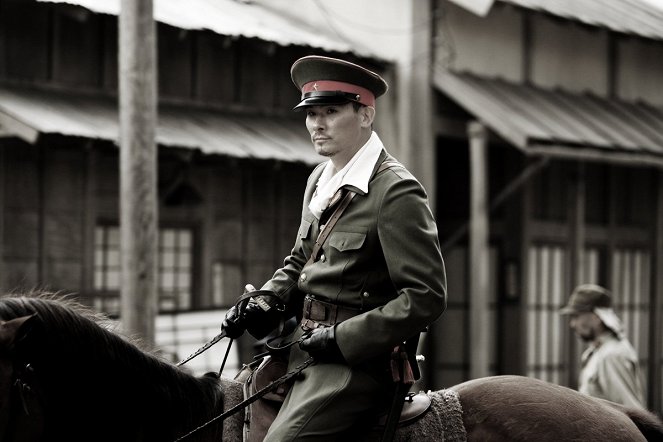Directed by:
Clint EastwoodScreenplay:
Iris YamashitaCinematography:
Tom SternCast:
Ken Watanabe, Kazunari Ninomiya, Tsuyoshi Ihara, Ryō Kase, Shidō Nakamura, Takumi Bando, Yuki Matsuzaki, Takashi Yamaguchi, Nae Tazawa, Lucas Elliot Eberl (more)VOD (1)
Plots(1)
In an effort to explore an event that continues to resonate with both cultures, Clint Eastwood was haunted by the sense that making only one film, Flags of Our Fathers, would be telling only half the story. With this unprecedented dual film project, shot back-to-back to be released in sequence, Eastwood seeks to reveal the battle of Iwo Jima - and, by implication, the war in the Pacific - as a clash not only of arms but of cultures. Sixty-one years ago, US and Japanese armies met on Iwo Jima. Decades later, several hundred letters are unearthed from that stark island's soil. The letters give faces and voices to the men who fought there, as well as the extraordinary general who led them. The Japanese soldiers are sent to Iwo Jima knowing that in all probability they will not come back. Among them are Saigo (Kazunari Ninomiya), a baker who wants only to live to see the face of his newborn daughter; Baron Nishi (Tsuyoshi Ihara), an Olympic equestrian champion known around the world for his skill and his honor; Shimizu (Ryo Kase), a young former military policeman whose idealism has not yet been tested by war; and Lieutenant Ito (Shidou Nakamura), a strict military man who would rather accept suicide than surrender. (Warner Bros. AU)
(more)Videos (2)
Reviews (9)
Letters from Iwo Jima is a nice film. The Japanese view of the incident is darker, more accomplished and more meditative than the American view depicted in Flags of Our Fathers. And, mainly, it works internally. The spectacular action scenes are all the more impressive due to the fact that there is a minimum of them and we see them only from a distance, thanks to which the film maintains a powerfully intimate nature. The sentiment and simplicity are tastefully balanced with a beautiful visual aspect and the minimalism of Clint Eastwood’s music, whose dominant feature is a fragile piano motif. Another pleasing aspect is the filmmakers’ affection for the Japanese and, in contrast to that, their contempt for the American soldiers in some scenes. It’s a shame that Flags is such an unworthy sibling to Letters and drags this ambitious diptych of films down to the level of a quickly thrown-together Oscar frontrunner. If more work had been put into Flags, these two films could have gone down in history together.
()
I don't understand how this Clint Eastwood war flick completely flew under my radar. It is a very decent affair from the viewpoint of the Korean people, where Clint beautifully shows that not all the soldiers were fanatics of the Emperor, but there were people with hearts who felt fear. The film has decent war scenes with no shortage of gore and features some very powerful moments (the shooting a family's dog and a mass sacrifice). 85%.
()
Without a doubt one of the best anti-war films ever to grace cinema screens. Eastwood is not playing "soldiers" or "good guys vs bad guys", his view of war is much more complex. His film is one of the few that looks at the soldiers of the Berlin-Rome-Tokyo Axis from the human side (in this respect, of the few cases before him, I remember Vilsmaier's Stalingrad, or the emotional ending of Riders in the Sky) and demythicizes the conventional view of ordinary Japanese soldiers as heartless war creatures with heads full of kamikaze. No matter which side of the conflict you are on, talking to a friend about family, making jokes, fearing death and questioning the meaning of war are all human feelings that are the same for everyone, regardless of the uniform they wear. Eastwood tells the story sparingly, but every minute has its place, and some scenes – the mass suicide, Baron's conversation with the wounded American soldier, the shooting of the prisoners, even the scene with the dog – are very memorable. And why not admit it, reading a letter from the mother of a deceased prisoner of war brought tears to my eyes, and in Eastwood's masterful rendition such moments are simply hard to resist. And if you think they are all made up, you are a lost cause. It is quite clear from the film that the greatest enemy in a war conflict is not a combatant from the enemy side, but the nonsensical orders of a moron in a superior uniform. Otherwise, the fight scenes have verve, although Eastwood commendably doesn't try to be as spectacular as possible (unlike, for example, Spielberg in the final battle in Saving Private Ryan) and the charismatic Watanabe is growing into a great actor in my eyes from film to film. With all due respect to my favorite Marty and his The Departed, the clear Oscar winner in my eyes is once again "Iron Old Man" Clint and his sensitive, empathetic masterpiece. The average rating on IMDb, 8.3/10, says much more about its real value than here on FilmBooster. And I don’t think half the votes there come from Japan.
()
My next encounter with war Eastwood, where the director once again shows that he is much closer to a human story than capturing war. He is not trying to make a great war film, but a great drama. I simply cannot forget some scenes from the movie. The scene with the dog, touching and harsh at the same time, Japanese fanaticism, which ends in mass suicide with a lot of grenades, a bucket of excrement, which means the difference between life and death. Even in war, there is room for happiness. An excellent film that surpassed its doppelgänger "Flags of Our Fathers". I admire Eastwood for not shooting in English, but in the right language, just like Mel Gibson did in "Apocalypto" or "The Passion of the Christ". That's how it should be. And not like the case of the film "The Girl with the Dragon Tattoo", which is great in the American version, but why the hell is it set in Sweden when the characters speak English anyway? More: http://www.filmovy-denik.cz/2012/04/diar-milovnika-filmu-c-0003-eastwood.html
()
I enjoyed this film very much. For me, it’s a completely different take on the exhausted topic of the Second World War, this time from the "opposite" side of the barricade, that does not carry the stars on the flag or bulletproof democracy. The Japanese are portrayed as a proud people who would rather fall to their last man than surrender their territory and, more importantly, their lives to an arch-enemy, which is very much reflected in the film overall. Eastwood conceived the battle of Iwo Jima in part as a probe into the souls of these determined soldiers, as evidenced by the battle sequences that keep a powerfully palpable dramatic face throughout. We gradually get very close to the protagonists, as if we were standing right next to them and crouching with them, hidden from enemy fire. I really felt sorry for those quite nice people who had to retreat step by step in the face of the ruthless American advance, and preferred to voluntarily put their lives on the lines in order to preserve their honour. Clint did a great job, with feeling and with all the life experience he has gathered throughout his life, and I have no choice but to bow in recognition. BRAVO, MAESTRO!
()



Ads